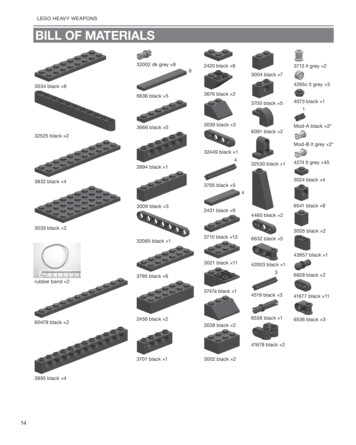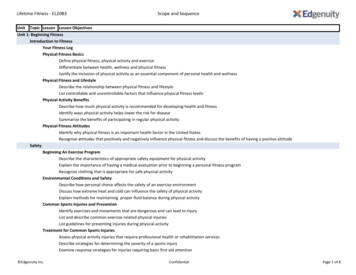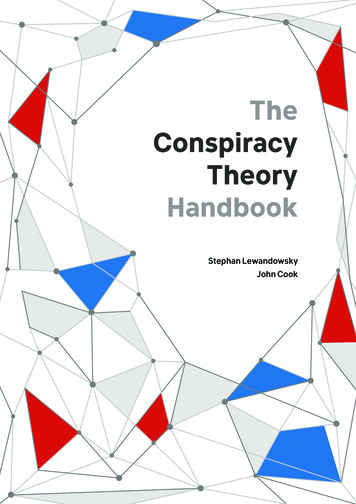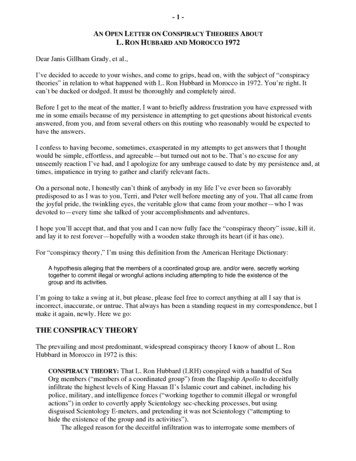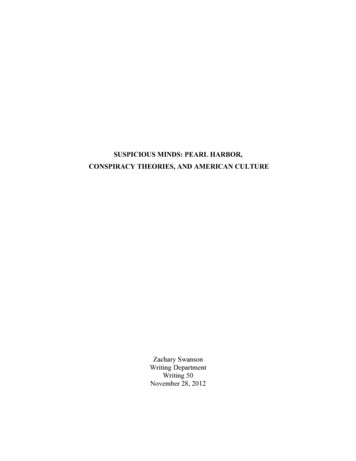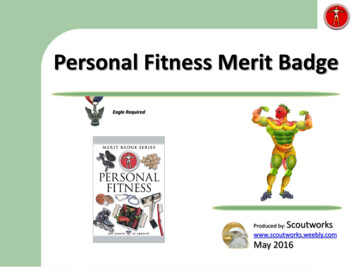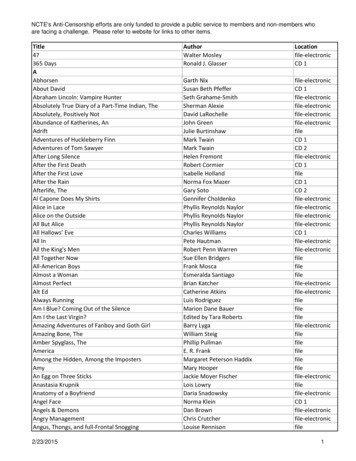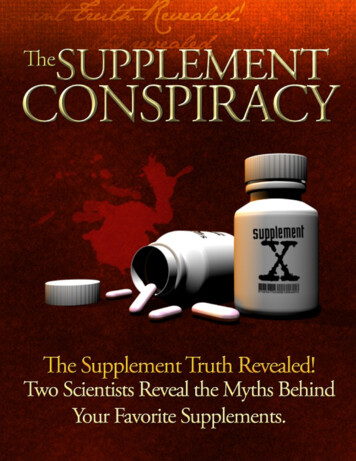
Transcription
ContentsWelcome! “Smiles Everyone, Smiles!”.3I Was a Big Supplement Sucker a Few Years Back .4The Story of “Mongo Lloyd”.5The Supplement Conspiracy. No One is Safe!.6Fitness Magazines Supplement companies BFF.7The Power Back Into the Hands of The People .8The Law of Reciprocity.9Introducing Two Scientists from the Supplement Industry.10Do You Need Supplements? The BIG Interview.11The End. Yep, The Very End!.31The Supplement Conspiracy2Rusty Moore - Fitness Black Book
Welcome!Have you ever been hesitant to do something you knew was right?What about something that would negatively effect you financially?Well, I am in that exact position!Let me explain.My name is Rusty Moore & I run a little fitness blogthat gets a crazy amount of visitors each day. Last month I had over onehundred thousand visitors and a Quarter Million page views.I'm Not saying this to brag. Heck, I'm as surprised as anyone that my sitehas grown to this level.So why am I hesitant to write this supplement report?As you will soon find out by reading this report, you probably don’tneed supplements the majority of the time. There is A LOT of money tobe made by selling supplements.and my site gets enough traffic for meto earn a Full-Time Income if I chose to sell supplements.What I am doing by writing this report is severely limiting my moneymaking options in the future as far as selling supplements goes.I do a lot of things wrong as far as making money online goes, but thismight just be the dumbest move yet. The good thing is that I believe'Karma' will pay me back by telling you the truth.Sincerely,The Supplement Conspiracy3Rusty Moore - Fitness Black Book
Supplement Suckers Unite!I was a big-time sucker when it came to buying supplements, especiallywhen I first began working out.Maybe you can relate to my story.I grew up in the 80's and reached my teenage years just as ArnoldSchwarzenegger became popular. I turned 14 when The Terminator(1984) came out.I wanted to get as big as Arnold.As Fast As Possible!That is when I found out about Protein. Iread in the fitness magazines that all the Probodybuilders got big by taking protein.NOT just any protein!These guys got this big, by taking proteinpowder that had magical ingredients notfound in food.Obviously these guys didn't take steroids.They were 265 pounds of pure naturalhealth. Why else would they be in a Healthand Fitness magazine!Of course you couldn't get Really Big, without Amino Acids!When Mongo Lloyd packed on 40 pounds in a year, he obviously took alot of protein powder (a given fact in the 80's). His real "secret" wasamino acids!The Supplement Conspiracy4Rusty Moore - Fitness Black Book
The Story of "Mongo Lloyd"So Mongo Lloyd outlined his workout routine, what he ate, and mostimportantly the supplements he took. He did photo shoots and interviewsfor all the big fitness magazines.Mongo Lloyd looked massive and had tons of teenage guys aiming forthat look. Not only was he massive, the guy was ripped! Sure he workedhard in the gym, but the difference between him and regular guys in thegym were all those fancy supplements he took.but he always forgot to mention his "best" supplements.You see, Mongo Lloyd had a special batchof supplements that worked better thananything he talked about in the magazines.He didn't mention them for this reason.As a 25 year old man, it was apparent toMongo's doctor that Mongo needed a bit of"hormone therapy".[Note the sarcasm above. This is an exampleof a serious "steroid hookup".]Mongo and others like him were the start of something bigger.I like to call the bodybuilding magazine era of the 80's and early 90's thestart of the big Supplement Conspiracy. It started with young men tryingto get big, but then slowly targeted every demographic.The Supplement Conspiracy5Rusty Moore - Fitness Black Book
The Supplement Conspiracy"Does my butt look too big?"If you thought the "gaining muscle" market was big then wait until yousee how many supplements they have for fat loss.Fat loss is a HUGE market for the supplement industry!Think about it. Almost everyone you know wouldn't mind being a littleleaner. So, the weight loss and fat loss market includes everyone.Eating fewer calories each day? It can't be that simple!While the main way to lose weight is to eat fewer calories each day thenwhat you burn, people don't want to hear that. They have a "feeling" thatthere is a quick fix that they haven't heard about.The Supplement Companies have marketing down to a science.Make no mistake about it, supplement companies have amazingmarketers and copywriters on their side. They are trying to make moneylike everyone else, so of course this makes sense. Unfortunately, manysupplement companies use tactics that are a little "grey" in my opinion. Claiming a supplement creates "steroid like" results A pill that burns 6X the fat compared to diet & exercise alone Citing company sponsored studies as "real research"But Misleading Advertising Alone isn't a "Conspiracy"The Definition of Conspiracy: A secret agreement between two ormore parties to perform an unlawful or unethical act.The Supplement Conspiracy6Rusty Moore - Fitness Black Book
Fitness Mags Supp Companies BFF!As Rob Base and DJ EZ Rock Would Say "It Takes Two.". If you aretoo young to get the 90's reference consider yourself fortunate!Fitness Magazines Used to Give Out "Unbiased" InfoI had a subscription to Ironman Magazine from 1988 until 1991. It was apretty solid place to get training advice. They outlined workouts thatproduced results without using steroids. There were helpful articles inthat magazine that didn't mention a supplement at all.In the early 90's, magazines began having more ads than contentWhen fitness magazines were at their peak,they cashed out in a big way. Instead ofhaving ads and articles separate.theycombined them as one.These ads became 3-4 pages and weredisguised as articles at first. The line betweenads and articles were blurred.In addition to that, many of these magazineand supplement companies formed one largerconglomerate. The money was flowing in likeclockwork.These mega-companies continued to flourish in the "Internet Age"In the first 10-12 years of the Internet's existence, companies with deeppockets still held the power to influence the masses. It was smoothsailing for these guys until 2004.The Supplement Conspiracy7Rusty Moore - Fitness Black Book
Power Back to the People!In 2004, Myspace reached critical mass. The site became so successfulthat it ignited a storm of other social sites. Today these social sites aregrowing at an exponential rate and have changed the face of theInternet.forever.Good news gets spread at a rapid pace, so does bad news!In the past, when you received bad service or a crappy product, you weremad and maybe would tell 1-2 friends about it. Today, you can reachthousands and even hundreds of thousands with the push of a button.Do you have a Facebook Page?As of this time, Facebook has 175 millionusers and each user has an average of 120friends.If you really wanted to you could probablyspread news to over 100,000 people withinhours. It would be hard to track, but we are soconnected it is certainly possible.Even Google is beginning to take notice ofuser generated content on these sites, so newsgets spread quickly and becomes permanent!Good Ole' adverting just isn't working as well as it used toSlick advertising is becoming less and less effective. Why listen to acompany talk about their product, when you can ask a friend? If youwere researching a supplement, ads aren't going to give you real info.People have a voice online and that is good news for you and me. Thegood companies will thrive and the bad ones will wither away.The Supplement Conspiracy8Rusty Moore - Fitness Black Book
The Law of ReciprocityThe Law of Reciprocity states "whatever you do will be returned back toyou". This is how mankind has worked since day one. I am a firmbeliever in the "give first and give often" philosophy.I'll take it a step further.I believe that to really thrive online, onemust give much more value than oneexpects in return. If a supplement doesn'thelp or work like it should and thecustomer paid money for that supplement,then that supplement company is headedfor failure.Too Much Yin and Not Enough Yang!The supplement companies that thrive inthe future are going to need to providegreat value for the money. Exaggeratedclaims and fake models aren't going to cutit anymore.There needs to be a balance between give and take. The SupplementConspiracy was doomed from the start. The Universe never fails toachieve balance over time.So the BIG Question is this."Which Supplements Work?"The whole point of this ebook is to help you understand whichsupplements are worth your money. You could read "biased"information from a magazine or website -OR- you could talk to thescientists who actually formulate and produce these supplements.The Supplement Conspiracy9Rusty Moore - Fitness Black Book
Two Scientists Who Aren't Afraid to TalkBefore I introduce these two gentleman, I need to explain a couple ofthings. The first thing is that no actual supplement brand names will bementioned. They also won't mention any supplement company names.Introducing expert #1: Brad PilonBrad is best known for his groundbreaking onlinediet course, Eat Stop Eat . Many of you mayrecognize Brad, but what you may not know is thathe worked for a number of years as Head of Researchand Development for a large supplement company.He was involved in product development, designedformulas, designed patents, etc. This makes him a topnotch expert when it comes to supplements andnutrition.Introducing expert #2: John BarbanJohn is best known for his men’s online course onsymmetry, The Adonis Effect . John is currently adirector of R&D for a supplement company. He is asought after expert on nutrition and supplementationand also does consulting work for many supplementcompanies. He has up-to-date insider knowledgethat few posses.This is NOT a pitch fest for a magical supplement!Sometimes these so-called unbiased reports and interviews wind upbeing a promotion of a special supplement. This is nothing like thatwhatsoever. These guys give their honest view on every supplementquestion asked of them.The Supplement Conspiracy10Rusty Moore - Fitness Black Book
The BIG Supplement InterviewHow the Interview Was Constructed: Brad and John wereinterviewed separately. We agreed that it would be best if theywould reply without hearing the other guy's answer. Then wewould list their answers next to each other to compare.This simple method worked out extremely well.I liked the fact that both Brad and Johncould take their time and really think aboutthe question before responding. I was goingto do an audio interview, but decidedagainst it.This e-mail format allowed me to time tocome up with better followup questions.With an audio, I tend to feel rushed.The result is a report that lets you comparethought out replies between two scientistswho have spent a large amount of time inthe supplement industry. Enjoy!Question #1: If someone eats a balanced diet, do theyreally "need" supplements. What I asking is this.is itpossible to get all the nutrients someone needs fromfood alone.John: I don’t believe there is one perfect diet, or even what you couldcall a ‘balanced diet’ that can be recommended to all people across allcultures, even if we are only speaking of people in north America as anThe Supplement Conspiracy11Rusty Moore - Fitness Black Book
example. I would think the better way to say it would be as follows: Inmodern industrialized countries it is difficult to become nutrientdeficient if you are living above the poverty line. Much of our food isfortified with nutrients to ensure we do not become nutrient deficient nomatter how ‘bad’ or ‘unbalanced’ our diet seems to be. For example,you’ll notice that table salt is called “iodized” salt, this is because iodinedeficiency used to be a major problem. The simplest and most effectiveway to get everyone to take enough iodine every day was to put it inwith our salt and commonly consumed goods like bread, and this wasadopted in the USA as far back as the 1920’s to ensure that iodinedeficiency would be wiped out in industrialized countries. Just to putthis into perspective as of 2003 the WHO (Word Health Organization)reported that there were still 1.9 billion people with insufficient dailyiodine intake across the world. Take a moment and thank your luckystars you’re not one of them.So bringing this little story back full circle to answer your question. It isvirtually impossible to become nutrient deficient in modern westerncountries no matter what you eat. Even if you think you eat a ‘bad’ orunbalanced diet, organizations like the WHO are way ahead of you. Ifyou live in north America or any industrialized country, and you have atleast a few dollars to spend on food in a day, you will most likely neverbecome nutrient deficient no matter what you do.If you have a specific goal you are after then maybe there is asupplement that can help you get there for example: Creatine to helpbuild muscle.We also have not taken into account genetic variability. In some rarecases people will find they don’t absorb a certain nutrient very well andsupplementing it might help. But make note of the word I used, RAREcases. This is not that common, and requires extensive testing todetermine.In general you can eat what you like and not worry about nutrientThe Supplement Conspiracy12Rusty Moore - Fitness Black Book
deficiency.Rusty (Follow-up): John I have to be honest, I never considered theWHO. Do they have other nutritional standards that western countriesmust meet when producing a certain food. Where do people go to findout more info on the WHO’s role in the way we eat?John: Most people in north America wouldn’t consider what the WHOis up to because as far as the WHO are concerned we don’t have anyproblems that are really difficult for them to solve. For example there arestill millions of people around the world that are malnourished and can’teven get clean drinking water every day. Our problems aren’t so dire,our major problem is having too much to eat, kind of a nice problem tohave compared to being so poor that clean water is an issue. If you wantto learn more about the WHO you can go to this linkhttp://www.who.int/en/ and browse around and see what’s going on inthe world and with their organization, I’d bet you would be reallysurprised what is going on right now.Brad: There are lots of examples around the world of people thrivingwithout eating what we would consider the ‘traditional North Americanbalanced diet’, so when people do eat with lots of variety I see little needfor additional supplementation. Unless we are talking about people in adisease state, or possibly the nutritional needs of growing children, I seelittle reason why a fully gown adult human would absolutely NEED tosupplement their diet, with the exception of convenience of lifestyle.Rusty (Follow-up): Brad I love nachos, pizza, hot wings, etc. I eatthem every so often and feel great and stay lean year round. Peopleassume that I eat nothing but salad and chicken breasts when they hear Ihave a fitness site. What are your thoughts on eating a variety of foods?Is it just fruits, veggies, and healthy fats and proteins –or- can people eat“normal” food in moderation and stay healthy.Brad: I think ‘variety’ can include foods that North America doesn’tThe Supplement Conspiracy13Rusty Moore - Fitness Black Book
consider to be super healthy – pizza is a favorite example. Madeproperly, I think this can a be a food that fits easily into a life style ofvariety. The preoccupation we have in North America of criminalizingfood is ridiculous. Good foods, bad foods.I mean.is a chocolatecupcake the Darth Vader of the food world? I’ve heard people say that itis ironic that the populations of the world who are most obsessed withhealthy eating are also the ones who are quickly becoming the mostobese and most plagued with chronic disease.Often times the protective benefit of simply eating less trumps the effectof eating more ‘healthy foods’.Question #2: What is your personal outlook onsupplements. Do you think everyone should takethem?John: I think it should be based on your personal goals. For example, ifyou want to put on as much muscle as possible it would make sense totake creatine. Creatine is well researched and shown to help increasemuscle mass. The available research indicates it is very well tolerated,effective and safe for use. If your goal is muscle mass or strength, you’dbe short changing yourself if you didn’t take creatine.With that said, not all supplements are as well researched and aseffective as creatine, and this is where the confusion about supplementscome in. Even though two supplements can sit on a store shelf side byside, there is no guarantee that they have the same level of researchsupporting their efficacy and safety. So you really are left to the mercyof each supplement manufacturer hoping that they are honest people andwon’t try to screw you. And I would say most big brands are doing theirbest to produce a quality product. After all, it is not in their best interestto make a product that makes all of their customers sick. It wouldn’t belong until they were out of business and being sued by everyone andtheir dog.The Supplement Conspiracy14Rusty Moore - Fitness Black Book
Rusty (Follow-up): John It sounds like creatine is a unanimouswinner when it comes to gaining muscle. Back in the early 90’s when itexploded onto the scene it was popular to mix it with grape juice. Whatis your recommended approach to using creatine? Do people really needto load it for 5 days?John: Loading isn’t necessary, you can just start taking one dose per dayand you’ll see results after a week or two, loading might get you there afew days faster, but by the end of 3 or 4 weeks it won’t make anydifference if you loaded or not. If you are going to load creatine youdon’t need to do it for five days, you can get the same result just loadingfor 1-2 days tops and then drop down to one serving per day, five daysof loading is total over kill and totally unnecessary.Brad: No not at all. I think they are an industry that have grown byleaps and bounds over the last decade, and as they become bigger andmore regulated their products will probably do very little harm, but fornow there is always a small risk associated with supplements. Assupplement companies become more and more profitable they havemore and more money to spend on investigating new and novelingredients that I believe are really beginning to touch on the realm ofpharmaceuticals. Yet, despite this advanced technology they do not needto conduct pharma style phase trials, and do not need to do tetrogenicityor drug interaction studies prior to marketing their product (this is not tosay that some companies don’t do this, just as this time, to the best of myknowledge it is not required). The bottom line is I think it is only amatter of time before one of them stumbles upon something very potentthat could possibly have very dangerous side effects.Rusty (Follow-up): Brad & John I heard a rumor a few years backthat the FDA was going to regulate all supplements likepharmaceuticals. It takes years for a drug companies to get a drugapproved, do you think anything similar will happen in the supplementindustry? Do you believe that legislation will tighten up at all when itcomes to supplements?The Supplement Conspiracy15Rusty Moore - Fitness Black Book
Brad: I hope so, but I have my doubts. Firstly, the supplement industryhas some very effective lobbyist groups working for them. Secondly,with the exception of the ephedrine scare, supplements haven’t reallyhurt too many people. Sure, there is the empty promises and hit to yourwallet, but to my knowledge its not like they are killing hundreds ofthousands of people. The sad thing is that regulation would make theindustry better. I know with 100% certainty that many of the bigcompanies already have excellent safety assurance and quality assuranceprograms in place. They could easily survive in a more regulatedclimate. It’s the small “look what we made in Jim’s basement”companies that wouldn't survive – and that’s not necessarily a bad thing.John: Trying to predict what the government is going to do in this areais tough. I don’t expect them to regulate them as strictly as drug simplybecause most of them aren’t anywhere near as effective as drugs andtherefore the demand just isn’t there. My guess is that the few productsthat show true drug like effects will get regulated on a case by case basisand perhaps get removed from the supplement category and moved intothe drug category of regulation. The rest of the products that don’t seemto do much but are also basically benign will remain in the obscurecategory of dietary supplement, not a food, not a drug.Question #3: Here is a scenario: Let's say I eat a wellbalanced diet, but also have a monthly budget left overfor supplements. 200 and want to drop 30 pounds. How do I spend thismoney each month?John: First I would start by doing some background research onproducts that are promoted to help with fat loss. Then decide if you thinkany of them fit with your lifestyle, medical history, goals etc. ThenThe Supplement Conspiracy16Rusty Moore - Fitness Black Book
gather some information from your local supplement store on the onesthat sell best, ask about customer feedback on which ones people seemto like. Also as the store clerk for the ones to stay away from and seewhat they say. From there you can make a semi informed decision onwhat you might want to take. If you wanted to spend the whole 200they will find 200 of stuff in the store to sell you. You could walk outof there with a fat burner, an appetite suppressant, protein powders,protein bars, etc etc A typical fat burner/appetite suppressant capsule product won’t be morethan 50/month. After that I can’t really think of what else you wouldwant to take to help with weight loss. You’ll probably end up with aprotein powder as well to make smoothies with. Some people really likedoing this as way to cut down on calories. They replace one biggerhigher calorie meal per day, with a lower calorie protein smoothie. Agood protein powder will probably run you about 40/month.So I don’t see any way to really spend 200/month on a weight losssupplements. You and I both know the rest of your weight loss willcome from eating less food and a good workout program.Brad: Books, night classes and martial arts class. Anything to keep youbusy and not thinking about food.Rusty (Follow-up): So, It sounds like less food is the answer andpossibly some Meal Replacement Powders as a way to reduce dailycalories. The fat burner is just the “icing on the cake”, the big resultscome from eating less calories with a strategic workout.John: Less food is always the answer. The trick is finding a way to do it. 200 and want to gain 10 pounds of muscle. How do Ispend this money each month?The Supplement Conspiracy17Rusty Moore - Fitness Black Book
John: Creatine is the best muscle builder by far, and it’s cheap.1000grams of creatine monohydrate will probably only run you 50.That’ll last you months. After that you might look into some protein, andmaybe some glutamine. I can’t point to any research that provesglutamine or protein helps with muscle building, but guys still seem towant to take them. You’ll most likely be given a sales pitch for somesort of “nitric oxide” stimulating product as well as branched chainamino acids and testosterone boosters. For true scientifically proveneffectiveness for muscle building I can only recommend creatine. Thereis one other testosterone boosting ingredient that has got some recentresearch showing it might actually boost testosterone so that might be aproduct worth trying out, but then you’re getting into hormonemanipulation that some people might not be comfortable experimentingwith. On top of that, just because it might boost testosterone there is noevidence that it will cause an increase in muscle mass the way creatinedoes.So for muscle building I think creatine approx 25/month, some protein 40/month, glutamine if you like 40/month, and testosterone boosterapprox 60/month.Rusty (Follow-up): John So really, someone could just invest increatine and make sure they get enough protein from food or adding in agood protein powder. That sounds like an affordable solution, sincecreatine only costs 25 per month. For someone who wanted to gainmuscle, without adding a bunch of fat what would you suggest theirprotein intake be? I hear so many different answers, but what do youthink is a good starting point?John: Most people in north America already eat more than enoughprotein for muscle building so chasing some mythical amount of proteinin hopes that you will build more muscle isn’t a smart investment ofyour energy. I just finished editing Brad’s new book on this very topic.The book is called “How Much Protein” and it’s the definitive answerabout protein and muscle building.The Supplement Conspiracy18Rusty Moore - Fitness Black Book
Brad: Take the 200 dollars and give it to the biggest guy in the gym.Tell him all you want to do is train with him for the month. Try to liftthe same weight as him. Become as competitive as possible. Strive tobeat him in a lift. Imagine there are millions of people watching the twoof you in competition and YOU are the underdog. Do everything youcan to keep up and eventually best his lifts. It will be the best 200 youwill ever spend.Rusty (Follow-up): Brad That is funny, but competition certainly is agreat motivator. It also never hurts to workout with someone one stepahead of you. A related question after the workout is complete, do yourecommend a post workout shake or anything of that nature for someonelooking to add size? The common advice is a fast absorbing proteinshake after working out and then a well balanced meal an hour after that.I used to drink Nestle Quick mixed with non-fat milk after working outwhen I was younger and it worked well.Brad: I’m just not sold on the whole post workout nutrition idea. Sure ithas been shown to transiently increase markers of protein synthesisthrough measurement of surrogate endpoints.but what the hell does thatmean? It’s also been shown to reduce protein breakdown and free radicalproduction and possibly cortisol – but how do we know these are notnecessarily components of the muscle building adaptation? Lastly,we’ve seen that you can increase the size and weight of muscle by takingcreatine after your workout, and creatine supplies no known nutrientvalue, so muscles CAN grow without immediate post-workout calories.The timing story is interesting, but the panic-driven need to eat rightafter your workout otherwise you will get ZERO results seems to bedriven more by marketing than logic.Question #4: Let's say I am just interested in gettingall my vitamins and minerals. What do I look for in amulti-vitamin?The Supplement Conspiracy19Rusty Moore - Fitness Black Book
John: I’d say take a multi that is in capsules instead of tablets. That’llensure you at least can absorb all of them. Tables are pressed togetherand have binders to hold them together. There is some research toindicate that you may not absorb everything that is in a tablet before youend up excreting some of it. But like I said before, it’s difficult tobecome nutrient deficient in north America anyway, so I would view amulti vitamin as an insurance policy or icing on the cake.You could also look at a multi vitamin that has something extra added toit so at least you’re getting something else in there.Brad: Avoid mega dose multi-vitamins. Especially the ones with superhigh doses of the fat soluble vitamins A and E. Look for a vitamin that isformulated in-line with the recommendations of the national academy ofsciences, and not one that simply tried to put 100% or more ofeverything into their formula.Rusty (Follow-up): So if the label says 200% of the RecommendedDaily Allowances, is that a bad thing?John: It might not be bad per se, but it’s unnecessary. Mega dosingvitamins and minerals hasn’t proven to do much of anything as far aspromoting any health related outcomes. Vitamins and minerals can alsobe overdosed to a point where they have negative consequences. Most ifnot all people in north America should be able to get all of their vitaminsand minerals from their diet. If for some reason you still feel like youneed a multivitamin supplement then I’d say take one that is at 100%RDA or lower.Brad: I just don’t see the value, and depending on the nutrient inquestion, see more risk than reward. There are a lot of things in life (andespecially diet and nutrition) where the rule of “more is better” failsus.so micronutrients are possibly no different.The Supplement Conspiracy20Rusty Moore - Fitness Black Book
Question #5: I got the audio cassette tape (showing myage) a while back called "Dead Doctors Don't Lie". Isit true that many vitamins in pill format don't getdigested in the stomach?John: Like I said above, tablets are pressed and use binders to hold themtogether so there is the potential that they are not fully absorbed,capsules break down very quickly and the full dose is readily availableto be absorbed in your system.Brad: Completely depen
"Does my butt look too big?" If you thought the "gaining muscle" market was big then wait until you see how many supplements they have for fat loss. Fat loss is a HUGE market for the supplement industry! Think about it. Almost everyone you know wouldn't mind being a little leaner. So, the weight loss and fat loss market includes everyone.


